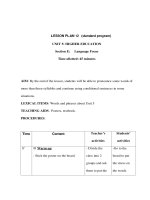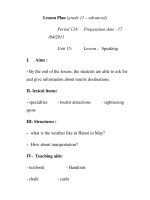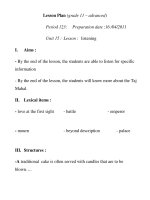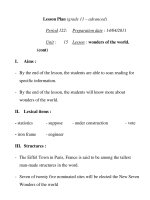18621 lesson plan keeping rules in public places
Bạn đang xem bản rút gọn của tài liệu. Xem và tải ngay bản đầy đủ của tài liệu tại đây (382.64 KB, 4 trang )
LESSON PLAN
Theme:“Keeping rules in public places.” School rules.
Guiding question for students’ discussion: “Why is it important to keep/follow the public
rules?”
Grammar: 1. Modal verbs of ability, prohibition, obligation, permission (CAN, COULD,
SHOULD, MUST, BE ALLOWED TO, HAVE TO) –Introduction-Presentation.
2. Conditional 1 (revision-consolidation+ New Vocabulary)
3. Present Perfect (Revision-consolidation+ New Vocabulary)
Aims of the lesson:
1. To develop students’ skills of speaking, reading, writing, thinking, listening and using grammar
structures correctly.
2. To give them opportunity to understand the importance of keeping/following the public rules. To
understand the consequences of BAD behavior.
3. To be well behaved and to be a model for younger generation.
PROCEDURE:
1. Organizational moment.
2.Theme, guiding question presentation
3. Brainstorming on the Guiding question+ Conditional 1, completing the
sentences, prepared by the teacher. And here we can use Present Perfect also by
asking: Have you ever…- Yes, I have. No, I haven’t
4. Work in groups, new vocabulary presentation and implementation using
grammar-Modal verbs. (In groups-independently, then will be checked with
teacher)
5. Groups works presentation. Checking their answers.
6. Further consolidation and implementation of the new vocabulary and Grammar
structures. Complete the sentences task: new vocabulary +Conditional 1.
7. A game (in pairs): “ Tell me frankly!” New vocabulary+ Have you ever…
+V3?
8. Work in groups: “Make up your own RULES OF BEHAVIOR in public
places.
(The teacher prepares names of public places in advance: e.g. (IN THE
CINEMA, IN THE SWIMMING POOL, IN THE LIBRARY, IN THE
PARKS, IN THE RESTAURANTS/CAFES).
9. Outcomes and giving home assignment.
1. Organizational moment:
T: -Good afternoon, students.
Ss: Good afternoon.
T: Today we are going to talk about the main things in public places-RULES OF
BEHAVIOR. Why do you think I mentioned the main things?
Students’ answers should be STARTED with the following constructions:
-Because..
LESSON PLAN
-If we don’t follow the RULES,….
-I have never+V3…
2. Well, thank you. Let’s think on the next question: our today’s guiding question:
“Why is it important to keep/follow the public rules? I would like you to be
divided into 2 groups: 1group will think about the importance of the rules using
modal verbs, e.g.: we mustn’t speak loudly on the lessons, in the theatre, cinemas, in
the reading hall and so on. We must keep safety rules on the Chemistry lesson, in the
swimming pool, and so on.
The 2-nd group’s task is to discuss about the consequences of bad behavior using
Conditional 1 structure:
1)If we are rude to people, …2) If we run in the corridor….., 3) If we speak loudly in
the library…., 4) If we get bad marks at school, ………5) If we fight with each other
in public places….,and so on GO! You have 5 minutes! (After the allowed time everything
is written by the teacher on the board in 2 columns and students should copy these very important
things.)
3. Work in groups, new vocabulary presentation and implementation using grammarModal verbs. (In groups-independently, then will be checked with teacher)
-Today, I would like to present new vocabulary for using immediately on this lesson.
(Teacher distributes them to every student). Now, please look at them and try to find
the words you have met before. After their identification, with teacher’s guidance,
students clarify the rest of them. Students try to give definitions, make up their own
sentences for better remembering, and ask questions.
New vocabulary:
Do well at school
Be rude to teachers or others
Do homework on time
Keep/ follow the rules
Break the rules
Speak Russian on English lessons
Fight with each other
Wear school uniform
Use bad words
Speak and laugh loudly on the lesson
Run in the corridor
Be late for school
Sleep on the lessons
Leave rubbish on the table after your eating in the cafeteria
Use mobile phones at breaks
Use mobiles on the lessons
Go to the doctor if you feel sick
Push each other on PE lesson
Respect elder people
Do sports every day
Help each other
Chew gums
Skip lessons
Miss lessons without reasons
LESSON PLAN
Leave our bags everywhere
Attend lessons every day
Follow the safety procedures
Throw garbage in the garbage bins
Push in front of others in the queue
Take several portions for other students
Buy food and drinks during lessons
Keep silence
Damage of school property
4. On this stage of the lesson, teacher implements the using of that new vocabulary by different
activities.
1. New vocabulary + MODAL VERBS
Teacher explains the meaning of Modal verbs once more by using these comfortable tables;
students see visually everything, try to create their own examples in the tables, and I think, Modal
verbs can be used immediately.
CAN - We use CAN and Could to talk about ability or opportunity
MUST/ HAVE TO/- We use MUST when you are obliged to do something; it is necessary to
do something.
SHOULD- we use SHOULD to give advice to somebody
MAY /BE ALLOWED TO/ -when we would like to ask something
Then students are divided into 2 groups with prepared beforehand papers with Modal
verbs: “CAN/ CAN’T; SHOULD/SHOULDN’T, MUST/MUSTN’T, ARE ALLOWED/ARE NOT
ALLOWED.”
1.CAN/ CAN’T 2.SHOULD/SHOULDN’T 3. MUST/MUSTN’T, 4. ARE ALLOWED/ARE
NOT ALLOWED.”
1 set is prepared for each group. Students work ON MATCHING THE NEW VOCABULARY
AND MODAL VERBS independently for 5 minutes. (Then present their works to each other. It
is a very interesting and useful activity, because students work with great interest and willing,
and this activity helps to self-bringing up).
2. New vocabulary+Conditional 1
Some cards with the uncompleted sentence are prepared in advance or
students can make up their own sentences at once.
Card#1.
1. If we skip lessons, __________________________________________
2. If students don’t follow the safety rules, _________________________
LESSON PLAN
3.
4.
5.
6.
7.
If
If
If
If
If
students damage school property,____________________________
we use cameras in the theatres, ______________________________
we push each other on PE lessons,____________________________
we leave rubbish in the cinema, ______________________________
we are late for school,______________________________________
6. Groups works presentation. Checking their answers.
7. Further consolidation and implementation of the new vocabulary and Grammar
structures.
A game (in pairs): “Tell me frankly!” New vocabulary+ Have you ever…+V3?
Tell me the truth: Have you ever+ skipped the lessons?-Yes, I have/ No, I haven’t.
Have you ever +used rude words towards your classmates?-Yes, I
have/ No, I haven’t.
8. Work in groups: “Make up your own RULES OF BEHAVIOR in public places, Grammar:
MODAL VERBS, CONDITIONAL 1.
(The teacher prepares names of public places in advance: e.g.
(IN THE CINEMA, IN THE SWIMMING POOL, IN THE LIBRARY, IN THE
PARKS, IN THE RESTAURANTS/CAFES).
Teacher distributes pieces of papers with the names of PUBLIC PLACES and groups/ or if there is
not enough number of students, in pairs, sit and work at making of these rules(home task)









